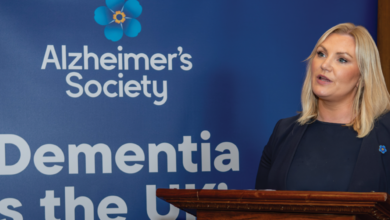Valuing and supporting older people
 An ageing population is an achievement for society rather than a burden but one which brings new challenges for how we deliver care. Health Minister Jim Wells, writing for agendaNi, sets out his vision for services for older people.
An ageing population is an achievement for society rather than a burden but one which brings new challenges for how we deliver care. Health Minister Jim Wells, writing for agendaNi, sets out his vision for services for older people.
Too often discussion around the increasing number of older people is negative, as if older people are a burden dragging down the rest of society. Let me put on record my view that our growing elderly population is one of our greatest achievements in terms of medical, social and technological developments and one to be celebrated.
Many older people play a significant role in their local communities, families and society as a whole, whether as carers, learners, workers or volunteers. In particular, older people are identified as important social resources in rural areas, providing informal care and supporting the cultural and social lives of their communities.
One of my main priorities is to ensure that this continues.
About a third of all men and half of all women will, after the age of 65, need long-term care and support. Levels of dementia and long-term conditions, such as diabetes, hypertension and stroke, are projected to increase dramatically as our population ages.
The regional strategy ‘Improving Dementia Services in Northern Ireland’ was published in November 2011 following an extensive public consultation process. In addition, the Delivering Social Change dementia initiative was launched in September 2014. It will reinforce and give effect to a range of recommendations in the strategy. The initiative will provide funding of £6.25 million over the next three years and will focus on three key strands: awareness raising, information and support; training; and short breaks, respite and support to carers.
The aim of the project is to transform the commissioning, design and delivery of dementia services in order to improve the quality of care and support for people living with dementia; promote better public awareness; reduce the stigma attached to the condition; and increase the skills and competency of those working in dementia care services.
Of course, not all care and support is provided by the Government. An army of carers give up their time to care for and support family or friends. Just because they give willingly and quietly, we shouldn’t underestimate how vital they are.
Although there is much that is good about current services, we must recognise that the system is coming under ever-increasing pressure. Each generation is living longer than the one before it. We are lucky to have an active older population who make a vital contribution to our communities. Yet as we get older our need for care and support will increase. By 2021, the number of people aged 85 and over is projected to increase by 67 per cent.
My priority is that people should be supported in remaining independent at home where possible. And we are doing just that. People with disabilities are also living longer which is a fantastic testament to how far society has come in terms of medical, social and technological development. We must ensure that our care system is keeping pace.
Life expectancy at the age of 65 has increased dramatically since the 1980s. However, not all members of society are benefiting from this progress. Too many people still die prematurely from preventable illnesses, or live with conditions that they need not have. There are a number of factors, both within and beyond individual control, which contribute to this, including:
• social and economic issues, such as education, employment, poverty, isolation and violent crime;
• lifestyle issues, such as alcohol or substance misuse, tobacco, diet, activity rates and sexual behaviour; and
• clinical services, including quality and access to health care.
The Executive’s Public Health Strategic Framework 2013-2023 aims to achieve better health and well-being for everyone and reduced inequalities for health. The vision and aims make clear that a societal effort is required, and that contributions from all levels are needed to fully realise the aims of the framework.
A key part of that is to promote prevention and early intervention. Health promotion activities are essential to improve the population’s health and reduce potential risk factors such as obesity, alcohol misuse and inactivity.
It is essential that we promote a life cycle approach to promoting healthy living, to delay or prevent the onset of illnesses in later years.
I recognise the need to ensure both that our care and support system remains sustainable into the future and also that the balance of responsibility between government and individuals is fair.
That is why my department is undertaking the reform of adult care and support which will take into account a number of key principles such as affordability and sustainability, quality, dignity and respect, equality and diversity, human rights, safeguarding and equity.
Growing old in good health and as a fulfilled member of society, enjoying a better quality of life, and remaining in charge of our own lives for as long as possible is something everyone aspires to.





